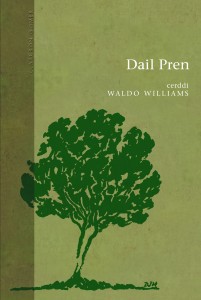In 1958 Waldo was given an Arts Council award in recognition of the excellence of Dail Pren. He immediately gave the £100 to UNESCO to be spent on furthering children’s education across the world.
Waldo had chosen a title for his volume of poetry long before he began collecting the poems for publication. It was a direct reference to the second verse in Chapter 22 of the Book of Revelations, thus, also, underlining his deep knowledge of the Bible as well as the thoughts of various philosophers: “and the leaves of the tree were for the healing of the nations”

A few of the literary critics were of the opinion that not all poems deserved to be included in the volume as they were frivolous and superficial compared to those poems which made the reader ponder as to what their significance might be. But Waldo argued that those poems in praise of characters he knew as a child were just as important as those that dealt with profound experiences, as he was also a social poet who wrote for his people in an accessible manner.
Probably the most popular and well-known poem of the volume is ‘Cofio’ (Remembrance) extolling eternal and everlasting virtues, referring to lost civilizations, the place of man within creation while at the same time accepting his insignificance within the cosmos. Or at least that is one interpretation. The poem became an Eisteddfod recitation piece ad infitum for a period and was thought to be no more than sentimental garbage. By today its status has been restored –
One fleeting moment as the sun is setting,
One gentle moment as the night falls fast,
To bring to mind the things that are forgotten,
Now scattered in the dust of ages past.
(translation by Alan Llwyd)
The circumstances under which the poem was composed are interesting since Waldo claimed it ‘came to him’ as the sun set when he was at the farm of his great friend, Willie Jenkins, at Hoplas, Rhoscrowther, near Pembroke. He was carrying out some chores around the farmyard at the time when he could hardly resist its ‘arrival’.
Just as interesting are the circumstances surrounding the composing of one of Waldo’s most abstruse poems, ‘Mewn Dau Gae’ (In Two Fields) written specifically to be included in Dail Pren. Waldo had endeavoured to entice its ‘arrival’ for some forty years as it was based on a mystical experience he had felt when relaxing as a boy in the two fields of a neighbour in Llandysilio. That moment of discovery in the midst of a ‘sea of light’ led to much self-questioning regarding the order and the purpose of creation along with the role of the Almighty within his own creation and kingdom:
Where did the sea of light roll from
Into Flower Meadow Field and Flower Field?
After I’d searched for long in the dark land,
The one that was always, whence did he come?
Who, oh who was the marksman, the sudden enlightener?
The roller of the sea was the field’s living hunter.
From above bright-billed whistlers, prudent scurry of lapwings,
The great quiet he brought me.
(translation by Anthony Conran)
Waldo’s own favourite poem was ‘Preseli’ written when he lived as an exile in England and a direct response to the threat of turning the hills of his boyhood into a permanent military exercise range. To him to make such use of what he considered to be sacred land would be sacrilege. This was the only poem of his which he ventured an English translation. The closing line has often been quoted from pulpits and the docks of law courts as a cry to withstand the defiling and adulterating of Welshness:
To the wall! We must keep our well clear of this beast’s dirt.
A reference to the last poem composed by Waldo, ‘Llandysilio-yn-Nyfed’, not included in Dail Pren, emphasises the wide span of his muse. In the sonnet he praises Saint Tysilio for refusing to take up arms as was expected of him but chose the path of peace. Such a path, of course, was central to Waldo’s own life.
Recently, Gomer Press published a splendid, hard-back edition of Dail Pren with an equally splendid introduction by Dr Mererid Hopwood, the first woman to have won the National Eisteddfod chair. She has also won the festival’s two other main literary competitions, the crown and literary medal. She is of course one of Cymdeithas Waldo Society’s Honorary Presidents.
